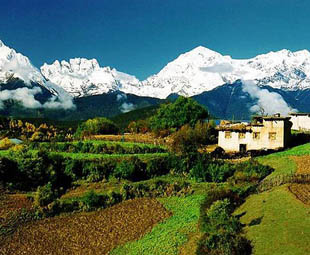One of China's leading tourist landmarks, Meili Snow Mountain, will be devoid of snow within 80 years if global warming trends continue, a meteorological scientist warned on Monday.
Liu Jiaxun also said China's lowest and southernmost glacier, Mingyong, has shrunk by at least 40 meters over the past 13 years.
The combined effects of ice melting and drying water sources would have devastating effects downstream, said Liu, deputy director of the Meteorological Bureau of Diqing Tibetan Autonomous Prefecture, in northeastern Yunnan Province.
Mingyong -- at 2,700 meters above sea level and 28.5 degrees north -- had the lowest elevation and latitude of all China's glaciers, said Liu.
At 11.7 km long and covering 13 sq. km, it was shrinking faster than any other Chinese glacier, he said.
Mingyong is located on the eastern side of the 6,740-meter Kagbo Peak, the highest peak on the Meili Snow Mountain, on the border of Yunnan and the Tibet Autonomous Region in southwest China. The mountain has been shrouded in mystery after attempts to climb it failed over the past decades.
Liu's observations were based on his study of global warming and its impact on scenic resorts, including Meili Snow Mountain, Baimang Snow Mountain and Haba Snow Mountain, in the province, after analyzing the meteorological data collected over ten years.
Glaciers were sensitive to changes in the global climate. With the world's climate warming up, almost all low latitude glaciers were melting.
The melting would result in floods, farmland damage and mud-rock slides, while the drying up would lead to river shrinkage and severe drought, Liu said.
In addition, the disappearance of the glacier landscape would destroy natural resources for scientific research and tourism.
"In Europe, the snow line of the Alps has truncated 100 meters in 50 years," said Liu. "The annual temperature in Shangri-la county of Yunnan has risen from 4.8 degrees centigrade since 1990 to 5.2 degrees in 2006."
Zheng Guoguang, president of the China Meteorological Bureau, said China had suffered 21 consecutive warm winters, pushing up ocean levels by 2.5 mm annually and the national average temperature in 2006 hit a record 10.2 degrees centigrade.
Diqing, also known as Shangri-la after the unearthly beautiful land invented by British novelist James Hilton in his 1930s novel "Lost Horizon", also boasts the Three Parallel Rivers World Nature Heritage Site recognized by UNESCO.
In order to better understand global warming and its impact on the Tibetan sacred mountains and the fauna and flora, Liu has initiated a series of scientific programs by carrying out routine tests and data-collecting activities on depth of snow and melting of glaciers.
"People tend to think that the melting is attributable to tourism, however, there is no direct evidence for that observation," said Liu. "The mining and industrial activities will always top the list of major contributors to global warming."
The number of domestic tourists in Diqing has increased from 517,500 in 1997 to 2.86 million in 2006, when foreign tourists numbered 308,000.
(Xinhua News Agency September 11, 2007)






